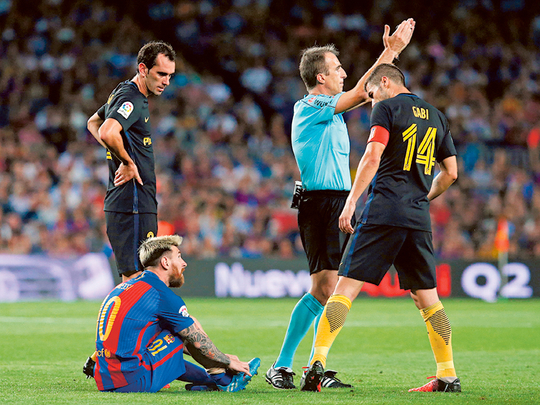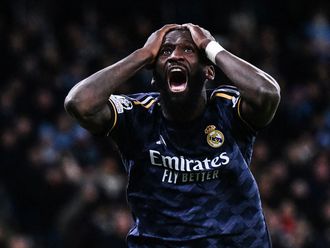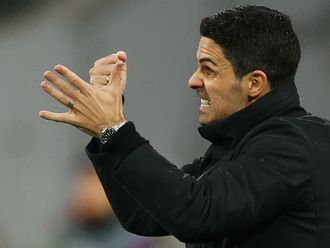
Barcelona: Perhaps a minute elapsed between Lionel Messi’s trudging off the field as he dejectedly clutched his left thigh and Angel Correa’s joyously clenching his fist as he celebrated the goal that gave Atletico Madrid a point at Barcelona. Those 60 seconds may prove the most significant of the entire Spanish league season.
Before that minute, Barcelona was cruising. Real Madrid, the league leader, had been held to a 1-1 draw by Villarreal earlier on Wednesday. Victory against Atletico would have taken Barcelona to within a point of its rivals at the summit of the league, with the momentum swinging very much in Barcelona’s favour.
But after that minute, everything felt different. Atletico and Barcelona drew, 1-1, which meant that Real Madrid, its mistake unpunished, had won. Barcelona remained three points back and will now be without Messi for at least three weeks because of a groin strain, as the team announced after the game.
An absence of that length will be bearable. If it stretches any longer — a few weeks, a few months — Catalan nerves will start to fray, even with Neymar, Luis Suarez and Andres Iniesta around.
That is not simply because, without Messi, Barcelona is just a little less formidable. There is another factor, too, that made those 60 seconds between his injury and Correa’s goal seem so seismic.
The standings at the top of La Liga, more than any other elite league in Europe, depend on the finest of margins. In the cash-soaked mayhem of England’s Premier League, contenders for championships can take solace after any stumble knowing that their rivals will have their low moments, too. The competition’s upwardly mobile middle classes increasingly guarantee that.
In Italy, Germany and France, the financial advantage enjoyed by Juventus, Bayern Munich and Paris St.-Germain means those three teams can absorb the occasional setback: To take advantage, after all, their closest competitors have to reach a sustained perfection that has proved, in recent years, entirely beyond them. Juventus effectively gave Napoli a five-match head start last year and still claimed the Serie A title comfortably.
Spain’s all-powerful triumvirate of Barcelona, Atletico and Real Madrid, by contrast, knows each and every slip could carry a heavy price, so assured is their superiority and so vast are their point tallies. Barcelona and Atletico have already had theirs: Barcelona lost at home to lowly Alaves last week, and Atletico started the season with two disappointing ties, against Leganes and Alaves.
Even five games into the season, there was a sense that Barcelona, in particular, could not afford another miscue. The players felt it — Iniesta suggested last week, after that reverse against Alaves, that there was no more room for error — and the fans did, too.
A couple of hours before kickoff, the streets around Camp Nou heaved with supporters clad in their azulgrana shirts. The bars and cafes on Carrer de la Riera Blanca were packed, fans taking advantage of the absurdly late, television-dictated kickoff — the match finished at almost exactly midnight, local time — to take their time over their bocadillos.
There was, though, also an eerie hush. Every bar had screens showing Real’s game in Madrid; almost every head was turned toward them. Everyone knew that what was about to happen here could be fully understood only in the context of what had happened there.
That is what, in the words of the newspaper Sport, made this “the most painful cut.” Villarreal had offered Barcelona a chance to atone for its error, and it had been spurned.
To some, of course, the quality of the opponent might have offered a balm. Atletico has reached two Champions League finals in three seasons and, in Diego Simeone and Antoine Griezmann, possess perhaps the finest coach, pound for pound, in the world and one of soccer’s most rapidly rising stars.
Just as important, there is a compelling argument that Atletico has become a sort of anti-Barcelona, with Simeone’s fevered pressing, his demand for endless industry and his inculcation of an indomitable fighting spirit all perfectly suited to stifling Barcelona’s expressionism, depriving Messi and the rest of space, denying them room even to breathe.
To many, though, Atletico remains Madrid’s second team and very much Spain’s third, the Crassus to La Liga’s Caesar and Pompey. Simeone has never beaten Barcelona in league play — although Atletico did eliminate the team in the Champions League quarter finals last season — and, before this meeting, had managed only two draws.
Little wonder, then, that the third seemed to hit so hard. As soon as Correa had cancelled out Ivan Rakitic’s opening goal, Camp Nou grew fractious. Every decision David Fernandez Borbalan, the referee, gave against the host team was greeted with disdain; every wayward pass, every wrong decision triggered howls of protest. When Gerard Pique and Jordi Alba missed late chances, there was even a touch of desperation.
It is still only September. Thirty-three games remain, with a colossal 99 points available. Nothing has been decided; no die has yet been cast. It would be easy to write off such restlessness as proof of how Barcelona has spoiled its supporters in recent years, how accustomed the crowd here has grown to winning without even breaking a sweat, how expectations have soared so high that many seem to believe victory comes with the ticket.
That, though, would be to misunderstand the exigencies of a Spanish title race. Real Madrid will drop points, of course, but there is no guarantee of how many, or how soon. This is not a league that affords many second chances. It is, instead, a league in which every minute has to be perfect.












